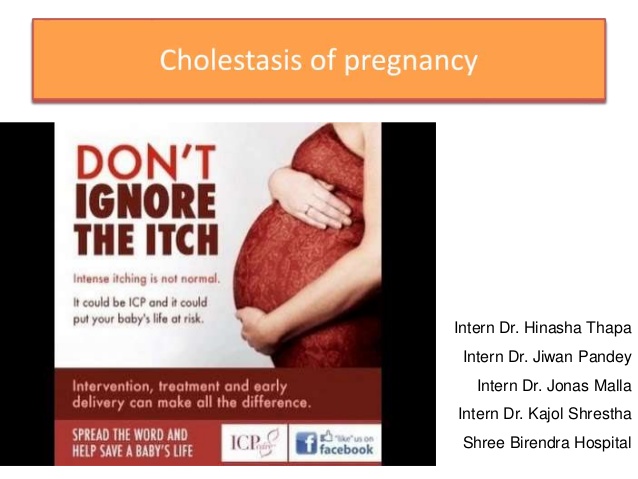Cholestasis Of Pregnancy

Contents:
- Who is At Risk of CP?
- How is it Diagnosed?
- Can Cholestasis Affect the Fetus?
- How is Cholestasis During Pregnancy Treated?
- Can Cholestasis Occur During Next Pregnancies?
What is Cholestasis in Pregnancy
Cholestasis of pregnancy (CP), also known as pregnancy itching, usually affects the liver, which is more susceptible to hormonal changes during pregnancy. The liver produces bile, which then goes down the bile ducts into intestines and helps in digestion. When the bile flow decreases, the bile salts gradually build up in the blood.
Itching is considered to be the main symptom of CP, which can intensify at nights, causing insomnia and fatigue. It usually starts with the palms and soles, and then spreads all over the body. Sometimes pregnant women can experience such severe itching that they can scratch the skin until it bleeds. Another less common symptom is jaundice. Itching usually disappears in two weeks after the birth.
Who is at Risk of ICP?
The extent to which CP is spread among women, depends on the country they live in. For example, Chile is the most affected country, while in Europe (apart from Poland and Nordic countries) it affects less than 1% of pregnant women.
CP is rare in the Commonwealth of Independent States, but if there is a cholestasis of pregnancy history in your family (say, your mother or sister had it), then you are at high risk.
How is it Diagnosed Cholestasis

Itching doesn’t necessarily mean CP. In can be caused by other factors, for example, by the skin stretching. In any case, it is highly recommended to visit a doctor to rule out CP. Itching related to CP usually begins during the last ten weeks of pregnancy. Occasionally it can start earlier.
Blood tests should include both liver and bile acids tests. If the test results are negative but itching continues, one more test should be done. This is necessary as itching symptom can sometimes develop long before testing positive for CP.
Unfortunately, there are no labs in Russia that specialize in CP tests. That’s why cholestasis of pregnancy is diagnosed by the exclusion of all other possible reasons for itching symptom. An ultrasound scan is recommended to check if gallstones are involved as they can block bile ducts. While Gallstones are generally rare during pregnancy, CP can trigger their development. That’s why CP is usually accompanied with gallstones.
Can Cholestasis Affect the Fetus?
CP increases the risk of a stillborn by 15 %. The baby can die exposed to the bile acids coming through placenta or, if placenta itself is affected by acids.
How Is Cholestasis During Pregnancy Treated?
Currently two types of medications are used to treat cholestasis. Most of the prenatal centers use a drug called ursosan, which is ursodeoxycholic acid. It reduces itching, stabilizes bile acids and liver function. With some precaution, steroids can be used to treat CP (for example, Dexamethasonum).
Women with CP are at high risk of postnatal bleeding. This is because bile helps to absorb vitamin K from food and this vitamin is essential for blood coagulation. In some hospitals pregnant women take vitamin K orally on a daily basis up till the delivery. It is one of the precautions to protect the mother and the baby from the bleeding.
The key goal of this therapy is to avoid a stillborn. To prevent this, the baby needs to be born as soon as its lungs are developed enough to live outside the mother’s womb. The fetal condition and development should be checked with regular ultrasounds. Many doctors believe that for women with CP, the ideal time for delivery is between 35 and 38 weeks. If the delivery is stimulated at this stage, the chances for the baby to survive are much higher than if the pregnancy is left up to 40 weeks.
Can Cholestasis Occur During Next Pregnancies?
There is rather high risk of cholestasis to affect next pregnancies, up to 80 %.